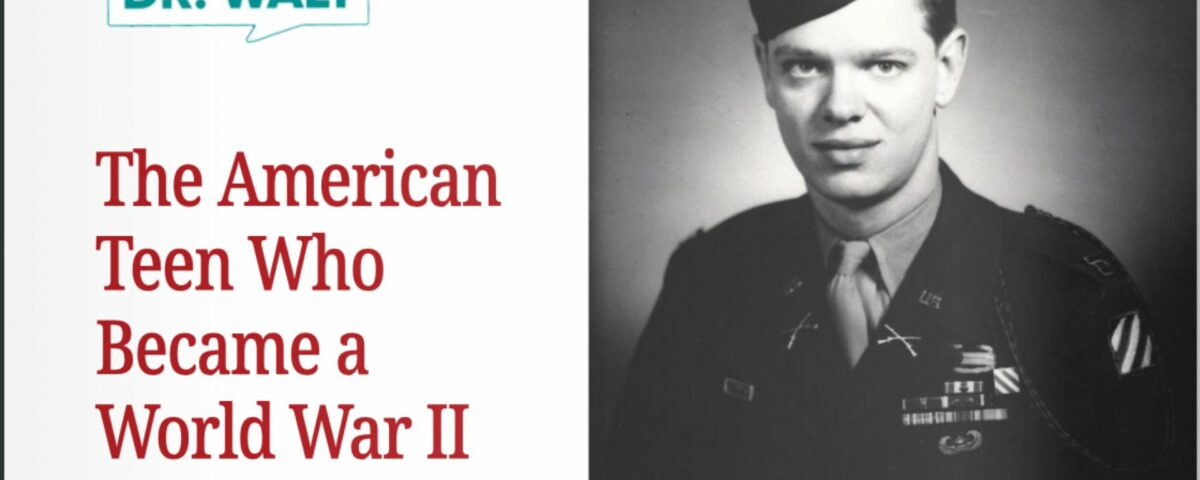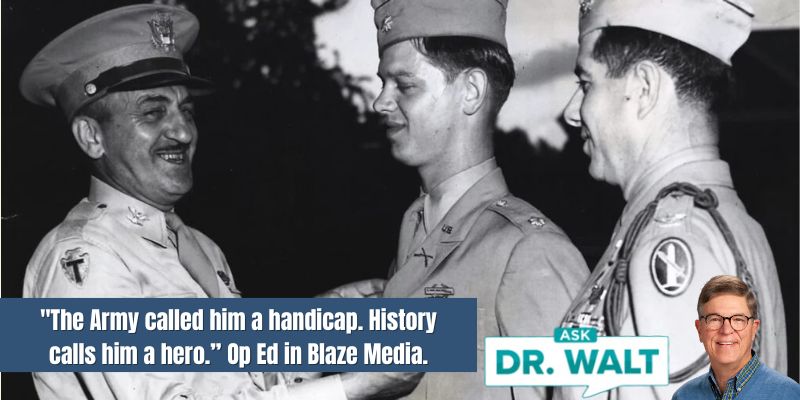
February 27, 1944 – Dad writes home from Anzio
February 27, 2024
February 29, 1944 – Dad his men survive a viscious attack on Anzio
February 29, 2024The American. magazine is a British publication for ex-pats. In their January-February 2024 issue, they ran an article about my father’s WWII exploits and heroics that I thought you might enjoy.
You can read the article at this link (starting on page 26), in the PDFs below, or in the transcript at the bottom of this post. You can also learn more about the book here..
The American Teen Who Became a World War II Hero
Phil Larimore was the youngest commissioned Army officer of World War II. His son, Walt Larimore, tells part of his incredible story


The American Teen Who Became a World War II Hero
Phil Larimore was the youngest commissioned Army officer of World War II. His son, Walt Larimore, tells part of his incredible story
Growing up in the 1930s in Memphis, Tennessee, Philip B. Larimore, Jr., was the ultimate Boy Scout—able to read maps, put a compass to good use, and traverse wild swamps and desolate canyons. On trips to the family farms of relatives, the youngster found great joy while hunting, fishing, and, most of all, caring for and riding horses.
But Phil did poorly in school and became somewhat of a discipline problem, leading his parents to banish him at 13 years of age to high school at Gulf Coast Military Academy (GCMA), where his innate gifts and talents, as well as his leadership skills, blossomed during his teen years.
As a 17-year-old, Phil graduated with honors from GCMA and Advanced ROTC just after the attack on Pearl Harbor and then became the youngest-ever graduate of the Army’s Officer Candidate School (OCS) at Fort Benning, Georgia. He was commissioned as a 2nd lieutenant in the Army just days after his 18th birthday, becoming World War II’s youngest commissioned Army officer.
The Forgotten Front
After completing over ten months of infantry specialty training, Phil boarded a Liberty ship that sailed nine days through the U-boat-infested North Atlantic to French Morocco before shipping out to the beachhead at Anzio, Italy. He entered the \war in January 1944, when the average life expectancy for front-line officers was only 21 days.
Assigned to the 3rd Infantry Division as the commander of an Ammunition & Pioneer (A&P) Platoon, Phil laid wire and landmines, defused German landmines, and delivered ammunition to the front line. Phil and his men often mad forays into no-man’s-land, facing nearly point-blank enemy fire every night.
After breaking out from Anzio, liberating Rome, and then training for the 3rd Infantry Division’s fifth amphibious D-Day (following Morocco, Sicily, Salerno, and Anzio), Phil and his men fought through southern France and into the Vosges Mountains, where Phil was severely wounded. Following his recovery, he fought in the Colmar Pocket in January 1945, the coldest winter in over 50 years. The battles were ferocious.
After celebrating his 20th birthday, Phil and his men battled across the Rhine River and through the Siegfried Line into Germany. During a two-day “respite” in early April 1945, Phil was sent on a top-secret mission via a Piper Cub into Czechoslovakia to find the world-famous Lipizzaner horses that Hitler had hidden away. The successful mission resulted in General George S. Patton authorizing Operation Cowboy, which saved the famed Lipizzaners.
“The man on the tank that bullets could not stop”
Then, on April 8, 1945, one month before V-E Day, Phil was leading his company in an attack in Germany when, in a hail of bullets and hand-to-hand fighting, he killed a German officer at point-blank range. When a scout patrol became surrounded, Phil climbed onto the turret of a Sherman tank and led a force to relieve his patrol. Facing suffocating enemy fire and single-handedly manning the tank’s 50-caliber machine gun, Phil eliminated three machinegun nests and dozens of the enemy. In the pitch of battle, he was struck in the helmet, and sniper bullets penetrated his canteen.
After running out of ammunition, another sniper bullet careened off Phil’s helmet, knocking from the tank. He engaged the enemy from the ground with his M1 Garand and was severely wounded.
Phil saved his soldiers—and a surrendering German officer called Phil “the man bullets couldn’t stop—but he lost his right leg. During one year of recovery, Phil received his third Purple Heart and his second Silver Star. He also helped initiate an equine therapy program at the hospital, perhaps the first such program at an Army medical facility.
But what happened after his hospital discharge makes Phil’s story incredibly special and heartwarming. He valiantly fought the War Department’s policy that all Army officers who were amputees had to be discharged and could no longer serve the Army and the country that they loved. Phil thought a policy considering amputee officers incapable of being “officers and gentlemen” was inane, insane, and inhumane.
While fighting to stay in the Army he loved, Phil was befriended by President Truman and General Dwight D. Eisenhower, with whom he played bridge weekly. Nevertheless, Phil lost his battle to remain in the Army by a Review Board’s 3-2 vote, leading to an honorable discharge and medical retirement as a 22-year-old major. For his actions that saved his patrol but almost cost him his life, Phil was awarded the Army’s second-highest valor award—the Distinguished Service Cross—and a parade by the entire Military District of Washington.
Phil took advantage of the GI Bill to complete undergraduate and graduate school at the University of Virginia. He then became a beloved professor at Louisiana State University, a nationally recognized and well-published cartographer (map maker), and a Boy Scout leader for over 40 years. He was a loyal husband to Maxine during 53 years of marriage and a devoted father to his four boys.
Phil Larimore died peacefully on October 31, 2003, at the age of 78, and is interred with his wife at Port Hudson National Military Cemetery near Baton Rouge.
On August 1, 2023, nearly 20 years after his death, the 3rd Infantry Division inducted Phil into its Marne Hall of Fame along with Generals John C. Marshal and Dwight D. Eisenhower. Also, General David Petraeus nominated Phil for the Officer Candidate School Hall of Fame. And I’m pleased to share his epic story in greater detail in my book, At First Light.
After the book was published, I visited my father’s grave. My eyes welled up with tears of gratitude. I leaned into the gravestone and whispered, “Dad, I always loved being your son. Now more than ever, I’m honored by it.”
Those of us who have never served in the military do not say thank you often enough to those who serve or served our country—not as conquers, but as liberators and stewards of freedom and liberty. Let’s never forget them—their suffering, their sacrifices, and their amazing successes.

In case you haven’t read or listened to Dad’s book, you can learn more or order it here.
Walt Larimore, MD, is an internationally recognized family physician educator and the best-selling author of over 40 books, including At First Light: A True World War II Story of a Hero, His Bravery, and an Amazing Horse. Walt and his childhood sweetheart and wife of 50 years, Barb, have two adult children and reside in Colorado Springs, Colorado. His website and blog can be found at https://drwalt.com.
© Copyright WLL, INC. 2024. This blog provides healthcare tips and advice that you can trust about a wide variety of general health information only and is not intended to be a substitute for professional medical advice, diagnosis, or treatment from your regular physician. If you are concerned about your health, take what you learn from this blog and meet with your personal doctor to discuss your concerns.





